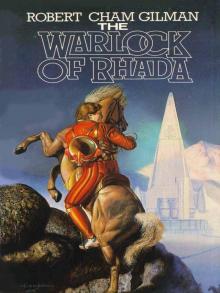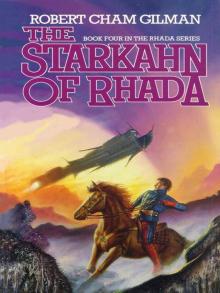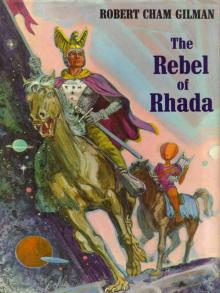- Home
- Robert Cham Gilman
The Warlock of Rhada Page 17
The Warlock of Rhada Read online
Page 17
Now, as he remembered the falling suns, the laser-beams with which the Empire could implode a star, he felt the hungry presence of another mind, a soldier’s mind, avid to drain him of his knowledge of destruction. Then came to him memories not his own. The feel of a war mare’s warm body between his thighs, the thrill of the charge, the jolting bite of steel into flesh, the sweaty fear of waiting in a darkened starship hold for the opening of the assault valve and then the surge into alien sunlight and the shrieks of men in battle. And something more from this mind, the essence that was Glamiss the Warleader--Ambition, the ravening goad of a desire to conquer, to unite, to dominate. It was purest atavism, the aggressive fury that had been bred out of the ruling class of Rigellian times. It was similar to the anger of the Rimworld barbarians who had swept back into the galactic center to smash the Empire, and yet different--for once again it was an outward thrust--a need to bring all the scattered, broken worlds together into--what? Ophir felt a shuddering thrill in the presence of a terrifying appetite for community. His sophisticated mind recognized it as a crude community of arms and oppression, but it was clearly recognizable for what it was--the Second Empire. As yet unborn, perhaps stillborn if Glamiss died here and now. But Glamiss’s mind defied death, defied the darkness, dragging Ophir’s with it into a soaring dream of the future--
Other images, as strong. A soaring cathedral of steel and glass beneath a double sun. Algol. Cowled Navigators at their prayers. The Litanies of Space. Ophir recognized the chanted words as scientific formulae, the manuals of the ancient starship captains of his own day, committed to memory by these austere and dedicated priests. I am Emeric Aulus Kiersson-Rhad, he thought, and felt a flush of pleasure at the Navigator’s memories of Rhada’s wind-lashed coasts and vast plains. That, at least, remained the same across the millennia of Sleep!
The interchange of memories was swifter now, as though this strange Triad sensed that it was burning the life from one of its members. Ophir, as a gift to the mind of the young Navigator (he knew now what the Order of Navigators’ function was in this time) concentrated on remembering that other Church that had, in another Dark Time, kept the light of learning flickering in the night--
Swiftly, and still more swiftly, the memories were shared among the three. All knew what each knew, their brains bursting with new images.
They saw the galaxy, spinning ponderously in emptiness, a million parsecs from its nearest neighbor in space. For an instant they struggled with the concept of the Universe’s reality, their merely human minds tottering, reaching, almost grasping--then falling back into the star-glowing spiral that was Man’s present destiny, defeated but exalted.
It was then that death came.
They could feel its lonely cold approaching. Not from the stars, but from the inner human depths, from the primeval animal soul of Man. It came out of the molten rock that cooled into a teeming sea and a chattering tribe in the trees. It came as the dark leopard, the serpent, the bite of iron, and the nuclear blast. Not with blinding light, but with shadowed sadness.
I am dying, brothers. Withdraw, withdraw, Ophir thought.
He sensed the disengagement. It was difficult and painful, as painful as the birth of their Triad had been. And he sensed something else, too. For this timeless moment, the Navigator and the Warleader had been one. But now their own personalities began to reassert themselves, and Ophir knew that the soldier was thinking of the power he now held, the knowledge of weapons that lay in the armory within the mountain and what they could mean to a conqueror-to-be. The priest was remembering the hell of war that had brought his Order into being and understanding, for the first time, that primitive men’s power to kill one another must be tightly leashed, lest a permanent darkness fall.
But Ophir’s nervous system was used up, seared by the flood of youth that had coursed through him under the influence of the machine. His brain alone functioned now, and soon it would stop, for his heart had stopped beating, his blood was cooling.
He made a last effort.
Do not fight one another, brothers, he cautioned. Work together.
He sensed the growing dichotomy, the divergent sense of purpose in the two young minds he had primed with his life’s knowledge.
He was regretful, but to him it could no longer matter. The primeval darkness closed in on him. He felt--alone. Glamiss and Emeric were gone and, with them, their vitality.
Yet it was strange. Death, that had a moment ago seemed so worrisome, came now as a friend. It is time, Ophir ben Rigell ibn Sol alt Messier thought, mentally smiling at his pompous, man-made dignities. Dihanna, it is time and past time.
The electrical activity in the old brain cells that was Ophir slowed and peacefully stopped.
The Warlock of Rhada was dead.
He had given Emeric and Glamiss a glimpse of the final serene darkness. It was his last gift.
Chapter Seventeen
The moment that Glamiss donned the feathered cape, he laid claim to the Star Throne. Considering that his following was fewer than fifty fighting men, it was a gesture of astonishing arrogance--and courage.
--Nav (Bishop) Julianus Mullerium, The Age of the Star Kings,
Middle Second Stellar Empire period
That night on Aldrin, called Vyka by the folk of that place, the Mythic Age died in a single thunderclap, killed by the hand of a Saint. I can say no more.
--From the Testament of Anselm Styr, Navigator,
burned by the Inquisition in the last year of Talvas Hu Chien’s Grand Mastership
Glamiss and Emeric went to the valley of Trama-Vyka as strangers and friends. They left it as enemies and brothers.
--Vikus Bel Cyb-1009, Rhadan Influences in Galactic History,
Middle Confederate period
Lord Ulm of Vara sat heavily on his war mare and surveyed the scene before him with dull despair. The light fading from the greenish Vykan sky still exposed a vista of military disaster. Five assaults had been launched against the rebellious warmen entrenched on the mountain, and the only tangible result lay all about him in the mounds of dead and the straggling lines of wounded.
Ulm’s slow mind struggled with the concept of defeat and what defeat would mean to him personally. Already, Linne Warleader was muttering to the other captains about Ulm’s inability to dislodge the rebels from their position. The leaders were listening to him, throwing dark glances at their bond-lord.
But that was not the worst. Halfway up the bloodied moraine the Bishop-Navigator was counting the casualties, ordering wounded men out of the action, and back to the starship in the meadow. Kaifa would not do that if he did not despair of Ulm’s ever accomplishing what he had set out to do.
In the light of afternoon, how simple it had appeared, Ulm thought dully. This morning he had left his keep with a thousand men and the approval of the Order of Navigators. Now the remains of his force stood near to mutiny and the Bishop offered no help, his dark Arab face grim in the fading light of the Vyka sun.
Ulm’s clumsy mind grappled with the reality of his situation. His warmen could be taken from him at any moment by any captain with a solution to the absurd blind alley into which the Varan force had drifted. It seemed to the warlord that Fate was conspiring against him. He had no sense that if Fate had conspired, it was not specifically against him, but in favor of another. The nexus of power had formed in this valley. A politico-military nucleus had taken shape, formed by forces stretching across time and distances beyond his imagining.
The forces were not beyond Kaifa’s imagining--far from it. The Bishop stood surrounded by more than enough military power to accomplish what the Order had directed him to accomplish. But it had been so badly used that he was helpless now. The fault, he told himself, was his own. From its inception, the move against Glamiss and this valley had been ill-starred. Small mistakes had grown into a pattern of personal catastrophe--personal, because the Order always survived and prospered. That was the bitterest reality, and--strangely--the only satis
faction the worldly priest could claim. For within that mountain, amid those marvels of Empire science he, Kaifa, had hoped to take for himself and the Order, was another priest. Suddenly, in the declining Vykan day, the power had shifted from his own experienced hands into those of Emeric Kiersson-Rhad.
For the first time in many years, Kaifa of Nasser, Bishop of the Order of Navigators, felt humbled by the strange and mysterious ways of God in the Star.
Linne Warleader marshaled his company for the last assault of the fading day on the rebels entrenched on the mountain. The troopers had lighted torches to make a fire-charge, and the orange light turned the bloodied rocks black. Linne did not imagine that his charge would be successful, but he had weighed the temper of his own men and those led by the other captains, and he felt certain that one more costly repulse would bring general revolt against the authority of the Lord Ulm.
Then, as custom demanded, he would seek the priest’s permission (which could not be refused) to challenge Ulm for the holding of Vara. The laws and customs of the feudatories of the Great Sky were simple and direct. A warlord ruled so long as he was fit to rule. Defeat was reason enough to cause his subordinates to challenge him.
The firelight played on Linne’s heavily bearded face. His eyes, close-set on either side of the iron nose-piece of his cone-shaped helmet, held an expression of triumph. He would lead the charge, even knowing it could not succeed. Then he would kill Ulm, assume his mantle, and settle down to starve the rebels from the warrens within the mountain. No amount of Empire warlockry could save them then. And the Bishop would return to Algol only after having consecrated Linne as holder of the lands of Vara-Vyka.
For a moment his dark mind even toyed with the idea of holding Kaifa and the Gloria on Vyka. A warlord with a starship of his own could spread havoc among the Rimworlds. Linne’s ambition, though livelier than the cloddish Ulm’s, still extended no farther than that.
The fear of excommunication touched him. Not because he feared the Star: Linne was a godless man--but because the men of Vyka would probably not follow a leader whom the Order refused to consecrate.
But one would see about that--later. Linne turned to give the command for the firecharge . . .
Quite suddenly the rebel position blazed with light.
The men in the moraine stared upward in superstitious fright. The light of their torches faded to insignificance in the incandescent glow from above. The war mares cried out their fear and anger.
Ulm’s face grew pale under his grimy beard. The Bishop, too, stared upward. He, of all those below, came nearest to understanding that the blaze of light was not supernatural, but some manifestation of Empire science. Yet it struck dismay into his heart.
Linne, his useless torch still held in his left hand, his heavy sword in his right, gaped at the gorgeous apparition that had materialized on the platform by the tunnel mouth.
Glamiss stood in a feathered cape that scintillated with a glory of light and color no Vykan had ever seen before. Yet it touched a hundred hidden strands of racial memory.
The young warrior stood draped in the regalia of the ancient King-Elector, heir to the Star Throne of a thousand suns.
A hushed murmuring fell on the armed men. Glamiss, his trappings sending spears of color and light into the darkening night, raised his arms. His voice, strangely amplified, rang out over the valley of Trama. Even the Navigators in the grounded starship a kilometer away heard it clearly.
‘‘People of Vyka! Hear me!”
The warmen of Ulm’s levy had never before been addressed as the “people” of anywhere. They were bonded warmen, predators to be sure, but little better than slaves in the service of a lord of a dark land. They listened, half-afraid, half-moved, as Glamiss spoke to them.
“You know me, Vykans! There is not one of you who does not know me! Now listen to what I have to say to you--” Kaifa, dazzled by the vision of a young Star King, stared open-mouthed. Years ago he had seen painted images of the great imperials, the kings of Nyor. This Vykan, this barbarian, was wearing the regalia of the Rigellian Galactons! A storm of conflicting emotions shook the Navigator’s sanity. The very look of the Vykan challenged ancestral loyalties even as it outraged priestly reverence for the ancient past.
Glamiss said clearly, “Here in the mountain is what is left of the Empire.” He raised his hand to display a small, rounded cone. “I command its powers!”
From the cone a thin beam of ruby light materialized as if by magic. Glamiss played it along the moraine and the rocks bubbled, coruscated, and ran molten.
“I command this weapon--and many more like it.“
The mares shrieked and backed away from the red-glowing stream of melted stone that trickled down the moraine. Kaifa bit his lips until he tasted blood. A laser pistol. No such weapon had been fired or even found in the known galaxy for four thousand years or more. Great Star, what else must there be in that mountain? he wondered.
Glamiss spoke again as the laser-beam flickered and died. “Within the heart of the mountain is a Falling Sun.” He searched the sea of upward-turned faces. “Do you understand me? Do you understand what it is in my power to do?”
Kaifa could stand no more. He thrust back his cowl and screamed, “Blasphemy! The Adversaries speak!”
Glamiss’s eyes searched out the Bishop. Kaifa shivered. Even at this distance he could see that some Power did, indeed, speak with Glamiss of Vyka’s voice. The face was that of a young man, but the eyes--the eyes were filled with a knowledge of things a man of this barbarian time could only imagine. Kaifa felt crushed and humbled by the weight of that knowledge.
“Hear me, Vykans,” Glamiss said more gently, though his voice still rang out over the dark valley. “It was Destiny that brought us to this place. Not the Adversaries, warmen, but the veritable Spirit of the Star.” His tone grew strangely distant. “If only I could share with you what I have learned, good people. If only it were possible. I have seen the glorious past of our race. I have seen a thousand suns shining on one flag, one people. And it will be so again!”
The warmen, sensing that something unique was happening, something huge and sky-moving, waited, listening.
“It begins here,” Glamiss said. “I raised the flag here--and--it--ends--in Nyor!”
The warmen stirred and stared at one another at the mention of fabled Nyor--the El Dorado, the capital of the Universe where gold and gems lay in the street for the taking. Was he offering them Nyor, they wondered? It was as though some savage king of another age offered men Valhalla--while they yet lived.
Glamiss’s voice turned harsh and demanding. “Ulm! Where are you, Ulm?” He searched the gathering and found his quondam lord. “You named me rebel, Ulm! You brought these men against me! Now I challenge you for Vara!”
Ulm stared at the cone-weapon still in Glamiss’s hand, his eyes round and protuberant, the sweat bathing his hairy cheeks.
Glamiss moved down the rubbled moraine and the blaze of light flamed about him, streaming from the stuff of the feathered cape woven for an Emperor’s heir. “Answer my challenge, Ulm! Do it now. Because these men of Vara are mine when this is done. And I will use them to take all of Vyka, and then Vyka will take the Rim--and the Rim will take Nyor! So answer my challenge, Ulm!”
“No!” The strangled cry came not from Ulm, but from Linne, mounted and armed, plunging from the ranks to confront Glamiss. “No, by all the Stars, it shall not be!”
He spurred at Glamiss, sword swinging free. From above came a cry of alarm: the folk of Trama had gathered there to watch the frightening play of events.
Kaifa waited for Glamiss to burn down the charging Linne with the laser, and then realized that instead, the younger man had drawn his flail.
Linne’s mare galloped swiftly, her claws bared, lips drawn back in a battle-shriek. Linne struck with his heavy-bladed weapon, and Glamiss’s morningstars screamed across the cutting edge as Linne went past, whirled his mare, and charged again.
The tip
of the sword pierced Glamiss’s mail and sent a feather of light from the glorious cape drifting into the darkness beyond the blaze of illumination in which they fought.
Linne yelled savagely and whirled still again, but as he charged this time, Glamiss’s flail caught his wrist and jerked him from his mare’s back. He tore himself free and struggled upright, grasping his sword with both hands. His face was distorted into a grimace of rage and frustration. He charged again on foot, stumbling in his manic fury against the upstart who would steal Vara from him.
He saw only the swift flashing of the starred iron as it descended on his face, and that was the last he ever knew, for the flail crushed him.
The warmen of Vara beat their weapons together in approval. They had been frightened by the manifestations they had seen, but this was a thing they knew and understood. A man had won their loyalty in single combat.
Glamiss turned to look up at the folk gathered on the platform above. He could see that Emeric had appeared among them. Emeric, his brother--more closely related to him now than any other man could ever be, for they had shared the Warlock of Rhada’s memories, and his death.
He heard the suddenly shouted warning and turned to see old Ulm, his face white and desperate, riding him down. There was a whirring and a sullen thud, and the lord of Vara’s face went blank with surprise.
He galloped past, tottering, clutching his saddlehorn, to fall among the darkened stones. There he lay still, the depressed wound of a crossbow quarrel welling blood.
Behind him, standing among the warmen, Bishop Kaifa held the crossbow.
Glamiss moved down the moraine and the warmen gathered about him, acknowledging his overlordship now easily, for there remained no one to challenge him for it.
When he reached the Bishop, Glamiss said, “Why? You saved my life--why?”
The Bishop’s thin, dark face seemed hewn from old iron.

 The Warlock of Rhada
The Warlock of Rhada The Navigator of Rhada
The Navigator of Rhada The Starkahn of Rhada
The Starkahn of Rhada The Rebel of Rhada
The Rebel of Rhada